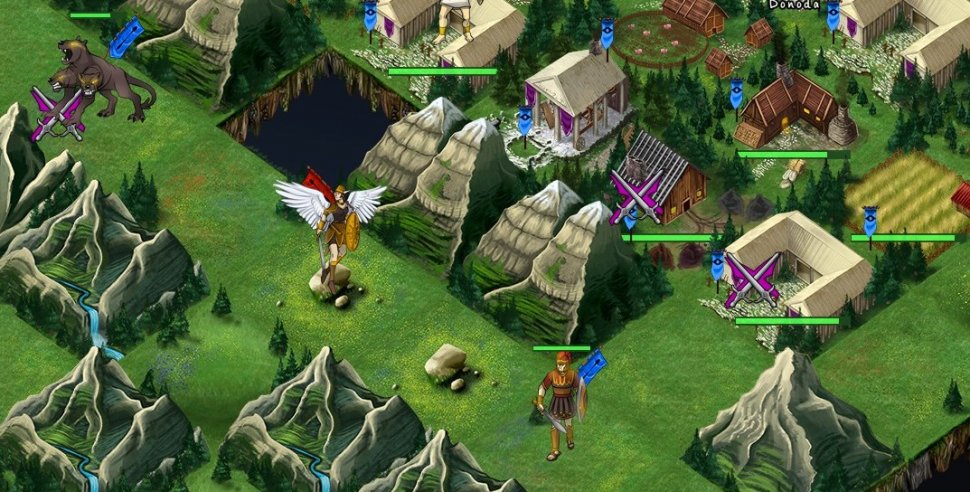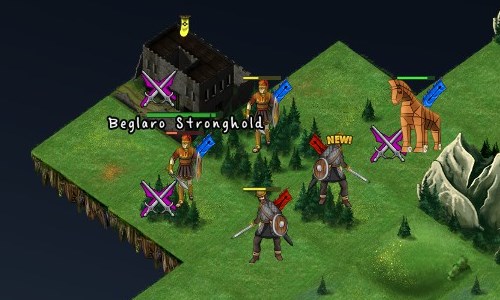
Mythological creatures, like the Valkyrie and Cerberus, can level the playing field but also raise new problems if left unchecked
Unfortunately, such a belief is debatable. My initial thought upon hearing Skyward Collapse’s premise and that it would be cooperative was, “and how will that work exactly?” The answer is that it only partially does. Up to seven other friends may join you via direct IP addressing (i.e., you host a game and provide your friends your public IP address) or via LAN. Each player that joins gets his or her own set of actions to take per faction, same as you, but they use the same pool of resources available to either side as well. If you had plans to build a couple of barracks for the Norse, and your friend builds some other buildings, you may find yourself falling a bit short on resources.
There is an undo button, fortunately, that will undo all player’s actions, but this undo action is performed in the same order in which the actions were taken. So if your friend created two buildings and then you created some land to try and build a new town hall, you’ll undo your land creation first and then the buildings. Communication and planning is key in any kind of cooperative situation, and it is especially true in Skyward Collapse. If you and your friends act freely without a considering the actions of others or the resources that are available, you will quickly find yourselves at cross purposes.
When you and your co-creators work in unison, however, the additional actions that each player brings quickly become a welcome boon. Even if resources aren’t available for the construction of buildings, those actions can be used to drop a resource pile that may come in handy next round or create some more land to allow for eventual expansion. The most common problem you’ll run across when playing in single player is that you simply don’t have enough actions to do everything you need to do in one round.

Bandits make for a great common enemy, but that doesn't mean either side won't attempt a little backstabbing
While you can store your action points by skipping a round (points carry over from round to round if unused), taking no actions can be quite risky depending on the situation in which you find yourself. This strategy will also only yield so much as you can store, no more than nine points total. Thus, with even three friends jumping into the mix and helping out, you’ve exceeded the maximum number of actions you could take in a single round when playing solo. All of these actions become particularly important when playing on the harder difficulty levels.
The downside to playing with friends is that when things aren’t particularly in a dire way, you (and they) may wonder what they’re contributing to everything. Skyward Collapse, on the whole, isn’t comprised of those moments like in Left 4 Dead or Halo where you or your friend just barely manage to eke out a victory in the face of seemingly inevitable defeat. Victory only comes after the end of 90 rounds and is the cumulative result of hundreds of actions, most of which will be rather mundane. Actions that, if you’re being totally honest with yourself, you could have done without the aid of another. This isn’t particularly the fault of the game or its designers, these type of strategy games don’t usually lend themselves to a great amount of cooperation. Arcen has done what it can with the overall structure and objective of the game, as I cannot deny that having someone else there that creates land so I can get a new town started is helpful. At times, though, it does feel like others are there “just because.”
I find it incredible that close to two months after their last release, the zombie action puzzler Shattered Haven, Arcen Games has released yet another genre-bending title. Shattered Haven itself fell on the heels of A Valley Without Wind 2. Even for a studio that’s constantly working on a few different titles at once that still seems like a lot to release in such a short span of time. Despite that, Skyward Collapse doesn’t feel like a game that was rushed to market. There are pieces that are being tweaked and updated, but the core elements of the game are solid. If you’re a fan of strategy games, then Skyward Collapse is well worth the $5 price of admission to see these unique elements in play. If you’re looking for a solid co-op experience, however, you may find it to be a bit off the mark. Bringing along your friends can be helpful when you’re really in the thick of things and need some extra actions to help smooth it out, but the rest of the time you may find yourselves just idly chatting while the rounds go by.
I suppose even a creator’s gotta rest at some point.
The Co-Optimus review of Skyward Collapse is based on version 1.007. A copy of the game was provided by the developer for review purposes.
Verdict
Co-Op Score
Overall
The Co-Op Experience: Up to 8 players can team up via Internet or LAN to work together to maintain balance between the Greeks and Norse. Each player gets 3 actions they can take per faction in a round and resources are shared amongst all players
Co-Optimus game reviews focus on the cooperative experience of a game, our final score graphic represents this experience along with an average score for the game overall. For an explanation of our scores please check our Review Score Explanation Guide.